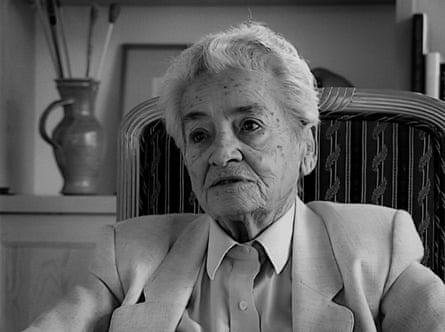There is so much second world war on television – history programmes, prestige dramas, celebrity genealogy shows – that you might assume all the most compelling tales have been told already, three or four times over. But not this one. And, oh, what a story it is. If the gay painter Willem Arondeus and the lesbian cellist Frieda Belinfante seem unlikely heroes of the Dutch resistance, that is only because official histories have taught us so little about the true nature of courage. Their incredible wartime adventures, which saved thousands of Jewish lives, are related here by the famously knowledgable former QI quiz host Stephen Fry – and even he had never heard of them. Even more noteworthy is the fact that, as Fry points out, their names are little known in the Netherlands.
Crucially, Fry brings more than erudition to the archive table. Viewing the Arondeus collection in Amsterdam’s Rijksmuseum, he not only notes the apparent influence of Oscar Wilde’s most famous illustrator, Aubrey Beardsley, but draws on his own adolescent experience to speculate on how Wilde’s persecution might have affected young Arondeus. “[It] would have cast a dark shadow on his sense of self … It made me think, ‘This is the fate of gay people … we will be outcast.’” Later, shown a yellow Star of David cloth badge, the kind that Jewish people were forced to wear, Fry shudders visibly. These are the visceral reactions of someone with a personal connection to the history, not a jobbing presenter on another indifferent gig.
Some evocative personal snaps are included – Willem in a cocked hat here, Frieda with a wry smile there – but it is Fry’s loving admiration that brings them to life. In his telling, the story of Willem and Jan the market gardener from Apeldoorn is revealed as the great tragic romance it always was. After parting for safety reasons in 1941, the two never met again, but clearly never forgot each other. When no illustrative archive material exists – the night of the daring arson attack on the Nazi records office, for instance – Fry uses dramatic skills honed on a thousand audiobooks to conjure up the necessary thriller-like atmosphere.
Director John Hay also deserves credit for bringing the excitement of a secret Dutch resistance meeting to a simple shot of academics rustling papers in a cafe. (It’s all in the framing.) Since design is so integral to this story – it was Arondeus’s drawing skill that made him an expert forger of ID documents – it is only right that the whole is put together with an elegant awareness of line and shape. One suspects Arondeus would have approved.

It helps, of course, that so much here is inherently cinematic. The vast underground bunker, constructed in 1938 by a prescient curator, Willem Sandberg. It was here that the works of Dutch old masters, including Rembrandt’s The Night Watch, could sit out the war, safe from thieving Nazi hands. Or the all-night forgery parties where, fuelled by booze and amphetamines, Arondeus would produce hundreds of life-saving identity documents to order. And then there is the human charisma bomb that is Belinfante.
Fry spends less time talking up Belinfante than Arondeus, but that is because clips taken from a 1994 interview allow this remarkable woman to speak for herself. She had already earned her place in history by the Nazi occupation of May 1940, as the first woman in Europe to conduct an orchestra. These prewar connections came in handy when she was able to call on the benefactor Mr Heineken for covert financial assistance. (Did you know the famous brewery was on the right side of history?) Belinfante eventually escaped the Nazis by disguising herself as a man for three months, and no doubt serving endless Marlene Dietrich-meets-Dirty-Harry lewks as she went. A diva. An icon. An inspiration to us all.
So there is more than enough to keep you fascinated without uncovering any deeper themes, but here is one anyway: this is a tale of what the Dutch politician Boris Dittrich calls “inter-solidarity” and Fry describes as “pure altruism”. That is, people willing to fight for the rights of oppressed groups other than their own. And they didn’t need to hear Martin Niemöller’s famous “First they came … ” poem to know what side they were on. He hadn’t even written it yet.
after newsletter promotion
Stephen Fry: Willem and Frieda – Defying the Nazis was shown on Channel 4 and is available on All 4.
"story" - Google News
March 03, 2023 at 05:30AM
https://ift.tt/tnpF2ur
Stephen Fry: Willem and Frieda – Defying the Nazis review – oh, what an astounding story this is! - The Guardian
"story" - Google News
https://ift.tt/QYnjswB
https://ift.tt/y26zxfX
Bagikan Berita Ini














0 Response to "Stephen Fry: Willem and Frieda – Defying the Nazis review – oh, what an astounding story this is! - The Guardian"
Post a Comment